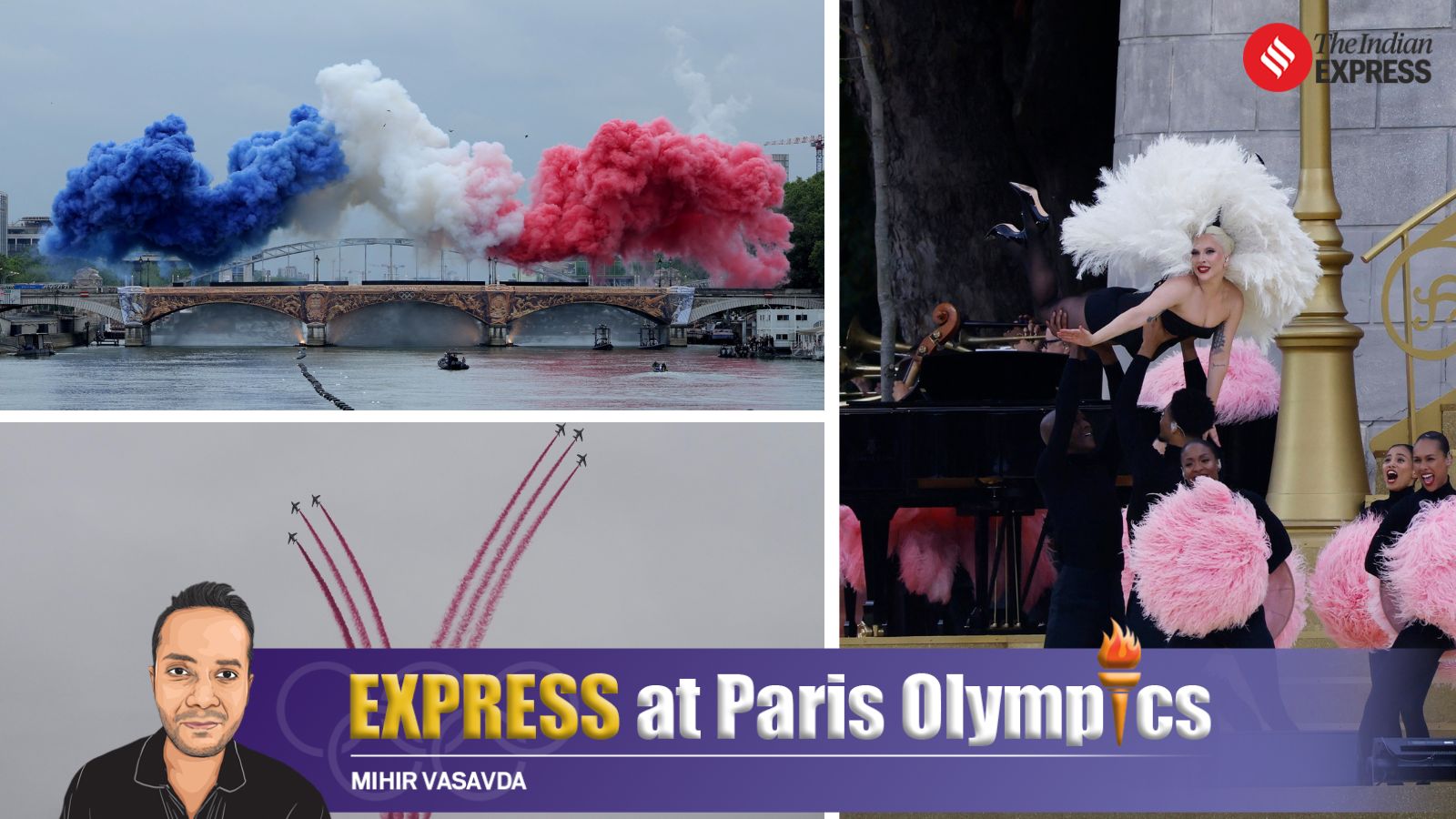AFTER THE arson attacks, bomb threats, the locked down city centre and bouts of anxiety came plumes of blue, white and red smoke with a splash of water — the ‘water curtains’ — on Pont d’Austerlitz. And in that instant, shortly after 7.30 pm local time, the whole of Paris heaved a collective sigh of relief.
What followed was a party never seen before on the Seine. There was Lady Gaga singing in French, little children taking the Olympic flame from Zinedine Zidane on a broken down metro (and then re-emerging on the parade along the river) and cabaret along with a celebration of love, music and sport — all in constant, heavy rain.
This was a rare evening when the French didn’t mind a laugh at their own expense, playing on the stereotypes and, like the creators had promised, “not being like everyone else”.
The first Olympics opening ceremony to be held outside a stadium began with a montage reminding just that — people running with the flame into an empty Stade de France, Paris’s iconic arena, only to realise that the Games will open on the River Seine. Fittingly, it was Zindane, the legendary former captain who showed France the way on the football field, leading the flame to the correct location.
Once there, the boats sailed down the Seine, ferrying the smiling, flag-waving and drenched athletes – 6,800 of them from 205 delegations. P V Sindhu, dressed in an ivory khadi georgette with orange and green print, and Sharath Kamal in a classy, minimalistic design kurta led the 78 Indians out in a dazzling show where the performances and parade took place in interludes. It ensured neither was a monotonous drag as had been the case earlier.


Cheering them on from the banks of this historic river were hundreds of thousands of Parisians, who took their spots along the 6 km route. They gathered in the gardens on both sides of the river, soaked in the rain. Those living in the Haussmannian buildings had a front-row seat, having watch parties in their balconies as a mysterious torchbearer shadowed the flotilla by running on the terraces above.
At different points, following the opening ceremony on the 6 km stretch felt like watching a Formula One race, wherein one got to see only bits and pieces of the action.
Among those in the stands at the Trocadero underneath the Eiffel Tower were VIPs from around the world; some received invitations while a few paid up to 2,700 euros (approximately Rs 2.45 lakh) for tickets. They were given access to a private train to reach the venue, which was largely out of bounds for most Parisians.
This was a ceremony designed to celebrate Paris as an Olympic host. But on the morning of this high-risk event, the Parisians woke up with a familiar feeling of dread.
Arson attacks on the rail service, temporary closure of an airport due to a bomb hoax, grey skies and a haunting city centre. It did not look like how the organisers would have imagined. It did, though, resemble what the locals had long been fearing.
There was a heightened sense of anxiety and tension around the city after a series of incidents that officials claimed were designed to “disrupt the Olympics”.

The state-owned railway company said they discovered arson attacks on three high-speed train lines, wherein the cable lines were set on fire leading to travel chaos across the nation.
No one claimed responsibility for the attacks but France Prime Minister Gabriel Attal, according to Le Parisien, launched an investigation into the incident, adding that “all our services are mobilised to track down, find and obviously punish the perpetrators”.
Four key high-speed networks connect Paris to the rest of France. Out of them, three were hit by what the SNCF described as “simultaneous malicious attacks”. The railway company’s chief executive Jean-Pierre Farandou said the cables used for signalling were set on fire.
One of the fires was at Arras, close to 100 miles north of Paris, on a line connecting the country’s capital and Lille. Another was set in Courtalain, a town 90 miles southwest of the Olympics host city, which connects Tours and Le Mans to Paris. The SNCF said that one more attack, on the rail line connecting Paris to South-Eastern France, had been thwarted.
The attack, it was feared, could impact French vacationers — many of whom were planning to flee Paris because of the disruption of normal life caused by the Games — and Olympics athletes who are scheduled to compete in other French cities and thousands of tourists expected for the first weekend of the Games.
Eurostar cancels trains
Eurostar said it was cancelling 25 per cent of the trains on Friday and the rest of the weekend on the entire network, mainly between Paris and London and Paris and Brussels.

Hours later, Basel-Mulhouse, a Franco-Swiss airport, was temporarily evacuated and closed for “security reasons” following a “bomb threat”.
The airport is located on the French side of the border near Basel, Switzerland. However, it proved to be a hoax and the operations were restarted later in the day.
As if the twin threats were not enough, the organisers were also battling nature with constant drizzle threatening to spoil the opening ceremony.
Le Monde, quoting economists Robert Baade and Victor Matheson, reported that the cost for the opening parade held between the Austerlitz and Iena bridges on the River Seine was estimated to be around 120 to 130 million euros, three times more than the London Games opening and closing ceremonies that cost 36.65 million in total.
As the news trickled in, the security along both banks of the Seine was tightened. Roughly 45,000 police and paramilitary officers were to be on duty on Friday evening and snipers were positioned on every high point along the river where the parade was to pass.
But none of it overshadowed the actual ceremony. After the last boat crossed Pont d’lena, laser beams from the Eiffel Tower lit up the Parisian sky. And in this city of love and lights, a flame burnt the brightest.


